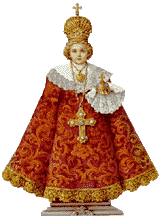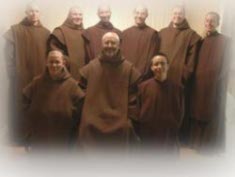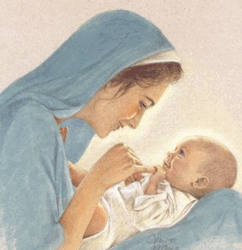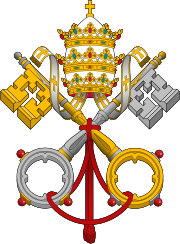From Fr Leonard Goffine's DEVOUT INSTRUCTIONS
INTROIT I am the salvation of the people, saith the Lord: in whatever tribulation they shall cry to me, I will hear them: and I will be their Lord for ever. Attend, O my people, to my law: incline your ears to the words of my mouth. (Ps. LXXVII.) Glory etc.
COLLECT Almighty and merciful God, graciously keep us from all things that are hurtful; that we, being set free both in mind and body, may with ready minds accomplish whatever is Thine. Thro'.
EPISTLE (Ephes. IV. 23-28.) Brethren, Be re newed in the spirit of your mind, and put on the new man, who according to God is created in justice and holiness of truth. Wherefore, putting, away lying, speak ye the truth every man with his neighbor, for we are members one of another. Be angry, and sin not. Let not the sun go clown upon your anger. Give not place to the devil. He that stole, let him now steal no more; but rather let him labor, work ing with his hands the thing which is good, that he may have something to give to him that suffereth need.
EXPLANATION St. Paul admonishes the Ephesians to lay aside the- old man, like a worn out garment, and put on the new man, that is, to renew their internal and external life. This renewal according to his teaching takes place, when we by a true repentance put away our vices, shun all lies, anger, injustice, &c., and adorn our soul with virtues, and zealously seek after Christian justice and perfection. We have, perhaps, already sought to change our manner of living, for which a jubilee or some other particular solemnity of the Church gave us occasion, and at that time, perhaps, purified our soul by a general confession, making the firm resolution to live for God, and work out our salvation, we appeared converted, and to have become other men: but how long did this conversion last? Ah, how soon did we fall back into the old, sinful ways. And why? Because we lived in too great, deceitful security. We thought everything accomplished by the general confession; we were satisfied, and omitted to employ the means of remaining in the state of grace. We did not thank God for the grace of conversion; we did not ask Him for the grace of perseverance; we frequented evil company, and did not avoid dangerous occasions; we indulged in idleness and pleasures as before. How can it appear strange, if such a conversion is fruitless? Ah, we should remain in wholesome fear even after the remission of our sins. (Ecclus. V. 5.) Even if we could say that we have done everything, nevertheless we cannot be certain, whether we be worthy of hatred or love. (Ecclus. IX. 1.) We should, therefore, work out our salvation according to the advice of St. Paul (Philipp. II. 12.) in fear and trembling, and thus not fall into the old life of sin, losing the hope of a new conversion.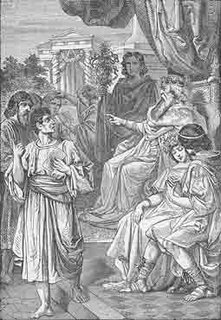 GOSPEL (Matt. XXII. 1-14.) At that time, Jesus spoke to the chief priests and the Pharisees in parables, saying: The kingdom of heaven is likened to a king, who made a marriage for his son. And he sent his servants, to call them that were invited to the marriage, and they would not come. Again he sent other servants, saying: Tell them that were invited, Behold I have prepared my dinner; my beeves and fatlings are killed, and all things are ready: come ye to the marriage. But they neglected: and went their, ways, one to his farm, and another to his mer chandise: and the rest laid hands on his servants, and having treated them contumeliously, put them to death. But when the king had heard, of it; he was angry: and sending his armies, he destroyed those murderers, and burnt their city. Then he saith to his servants: The marriage indeed is ready; but they, that were invited were not worthy. Go ye therefore into the highways, and as many as you shall find, call to the marriage. And his servants going forth into the ways, gathered together, all that they found, both bad and good; and the marriage was filled with guests. And the king went in to fee the guests; and he saw there a man who had not on a wedding garment: and he saith to him: Friend, how camest thou in hither, not having on a wedding garment? But he was silent. Then the king said to the waiters: Bind his hands and feet, and cast him into the exterior darkness: there shall be weeping and gnashing of teeth. For many are called, but few are chosen.
GOSPEL (Matt. XXII. 1-14.) At that time, Jesus spoke to the chief priests and the Pharisees in parables, saying: The kingdom of heaven is likened to a king, who made a marriage for his son. And he sent his servants, to call them that were invited to the marriage, and they would not come. Again he sent other servants, saying: Tell them that were invited, Behold I have prepared my dinner; my beeves and fatlings are killed, and all things are ready: come ye to the marriage. But they neglected: and went their, ways, one to his farm, and another to his mer chandise: and the rest laid hands on his servants, and having treated them contumeliously, put them to death. But when the king had heard, of it; he was angry: and sending his armies, he destroyed those murderers, and burnt their city. Then he saith to his servants: The marriage indeed is ready; but they, that were invited were not worthy. Go ye therefore into the highways, and as many as you shall find, call to the marriage. And his servants going forth into the ways, gathered together, all that they found, both bad and good; and the marriage was filled with guests. And the king went in to fee the guests; and he saw there a man who had not on a wedding garment: and he saith to him: Friend, how camest thou in hither, not having on a wedding garment? But he was silent. Then the king said to the waiters: Bind his hands and feet, and cast him into the exterior darkness: there shall be weeping and gnashing of teeth. For many are called, but few are chosen.
REMARK Thir parable agrees in many respects with that for the second Sunday after Pentecost, and has the same meaning. See, therefore, the explanation of that gospel, as also of the feast of SR Catherine, to which Maybe added the following:
EXPLANATION In this parable the king is our Heavenly Father who has espoused His only-begotten Son to the Church, and on this occasion prepares the most sumptuous marriage-feast by giving the evangelical doctrine, the holy Sacraments, and the heavenly joys. The servants sent to invite the guests are the prophets, apostles and disciples of Christ. Those invited are the Jews who despised the honor and grace of the divine King, destined for them, abused and killed His servants, and were, therefore, cast aside and with their city Jerusalem, destroyed by the armies of their enemies, as a just punishment; in their stead the heathens and all those nations were called, who were on the broad road to destruction, and who now occupy the places of the unfortunate Jews at the marriage feast of the Church, and shall also occupy them in heaven. In the Jews to whom Christ addressed this parable, is verified that many of them, nay, all are called, but few chosen, because they would not heed the invitation.
APPLICATION We have the honor not only to be invited to this marriage-feast, but are in reality guests at it, because we are members of the Church of Christ by faith. "But the Christian," says St. Gregory, "who is a member of the Church by faith, but has not charity, is like to a man who comes to the marriage-feast without the wedding garment." With this garment which is charity, Christ was vested, when He came to celebrate the nuptials with His spouse, the Church, and by the bond of charity the Son of God also unites Himself with His elect. He clearly lets us know that charity is the wedding garment which should vest us. Those, therefore, who believe and are in the communion of the Church, but who do not preserve the grace of charity, are indeed in the wedding-chamber, but they are not adorned with the wedding garment. They are dead members of the Church, and shall not be admitted without this garment into the celestial marriage-feast in the triumphant Church, but rather be cast like that unfor tunate guest into exterior darkness. This guest was silent, when asked by the king, why he had not .the wedding gar ment. By this we see, that no one can excuse himself to God for not having charity, because every one can have it, if he asks it from God, and, as St. Augustine says, our heart is the workshop of charity, and every one who has a heart can practice it.
PRAYER I thank Thee, O Jesus, that Thou didst call me to the marriage-feast in Thy Church; give me the wedding garment of charity that I may be present at the celestial marriage-feat, and not be cast into exterior darkness.
after http://www.truecatholic.org/books/goffine/pentecost19.htm
skip to main |
skip to sidebar

This is the Carmelite shield of the Ancient Observance. The palm and the lily signifies the first saints of the order: St. Angelus of Sicily (signified by the palm of martyrdom) and St. Albert of Trapani (signified by the lily). Six pieces of spiritual armour are described in the rule of the Order; the cincture is the symbol of purity, indispensable for one who desires to reach the holy mountain of the vision of God: "Blessed are the pure of heart, for they shall see God". The corselet which protects the vital parts of the body represents good thoughts: "Holy thoughts will protect you". The breastplate which covers the whole body represents justice, a well regulated life, the observance of the commandments and duties of daily life. The shield is faith; for a living faith is the best safeguard for the spiritual life. The helmet symbolizes hope, confidence in God, which gives us the right to walk with freedom and confidence. Finally, the sword indicates conversation with God which as a double edge blade comes to our aid and defends us in all our difficulties.

Mount Carmel, Carmelite Monastery - beautiful statue of Our Lady. Picture credit: Karmel im Heiligen Land

Carmel in Toledo - Under Our Lady's mantle - St Elijah in Carmelite habit in company of other prophets (lower left panel). Picture credit: Karmel im Heiligen Land
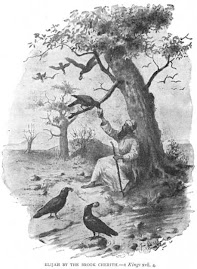
1Kings 17:4 - Elijah by the brook of Cherith

Elijah statue in front of Carmelite Monastery on Mt Carmel







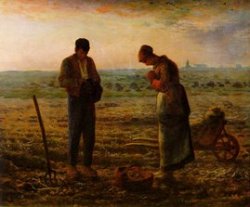

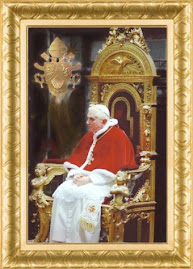


This blog is to propagate genuine Catholic devotions in the spirit of Traditional Carmel by providing texts useful for spiritual readings and meditations. "The devil knows that he has lost the soul that perseveringly practices mental prayer" - St Teresa of Avila. "For we preach not ourselves, but Jesus Christ our Lord; and ourselves your servants through Jesus" (2Cor 4:5). Soli Deo honor et gloria. The blog is lovingly dedicated to the Infant Jesus of Prague and under His Patronage
THE INFANT JESUS OF PRAGUE
Search This Blog
ABOUT CARMELITES

This is the Carmelite shield of the Ancient Observance. The palm and the lily signifies the first saints of the order: St. Angelus of Sicily (signified by the palm of martyrdom) and St. Albert of Trapani (signified by the lily). Six pieces of spiritual armour are described in the rule of the Order; the cincture is the symbol of purity, indispensable for one who desires to reach the holy mountain of the vision of God: "Blessed are the pure of heart, for they shall see God". The corselet which protects the vital parts of the body represents good thoughts: "Holy thoughts will protect you". The breastplate which covers the whole body represents justice, a well regulated life, the observance of the commandments and duties of daily life. The shield is faith; for a living faith is the best safeguard for the spiritual life. The helmet symbolizes hope, confidence in God, which gives us the right to walk with freedom and confidence. Finally, the sword indicates conversation with God which as a double edge blade comes to our aid and defends us in all our difficulties.

Mount Carmel, Carmelite Monastery - beautiful statue of Our Lady. Picture credit: Karmel im Heiligen Land
Carmelites are one of four mendicant religious Orders, originally founded in ancient Palestine with spirituality drawn from the imitation of the holy Prophet Elijah and zealous veneration of the Blessed Virgin Mary. The Order is dedicated to Our Lady, she is particularly honoured and venerated by Carmelites and the life of Carmelite should be focused on imitation of Mary. Devotion of the Brown Scapular, Mary's habit, caused Carmelites to be known as "Brothers of the Blessed Virgin Mary of Mount Carmel", to which Popes and Bishops attached indulgences. The oldest preserved constitution of the Order, established during General Chapter of Barcelona (1324), tells us that from the times of the holy Prophets, Elijah and Elisha, devout hermits lived continuously on Mt. Carmel, sought this holy mountain and loved its solitude in order to give their minds over to the contemplation of heavenly things; they built a chapel there in honor of the Virgin and thus deserved to be called the Brothers of Our Lady of Mount Carmel, a name recognized by Popes. St. Albert gave them a rule which was approved and the Carmelites, as we know them today, are successors of these holy hermits. Therefore, from its origin, their spirituality has been founded on these two specific elements, an imitation of the holy Prophet Elijah and veneration of the Blessed Virgin Mary (from Bl Titus Brandsma - "Lectures on Carmelite Spirituality" - Carmelnet).

Carmel in Toledo - Under Our Lady's mantle - St Elijah in Carmelite habit in company of other prophets (lower left panel). Picture credit: Karmel im Heiligen Land
Therefore, since the beginning of this blog established to promote Carmelite spirituality, special care has been taken to dedicate meditations of Saturday - day of Our Lady in Church's tradition - in honour and veneration of the Blessed Virgin, the ever glorious Patroness of all Carmelites.
ST ELIJAH AND CARMELITE SPIRITUALITY

1Kings 17:4 - Elijah by the brook of Cherith
In The Book of the First Monks, a medieval Carmelite work on the spirit of the order, the following teaching stands out: "The goal of this life is twofold. One part we acquire, with the help of divine grace, through our efforts and virtuous works. This is to offer God a pure heart, free from all stain of actual sin. We do this when we are perfect and in Cherith, that is, hidden in that charity of which we read: "Charity covers all sins " (Prov. 10:12 ). God desired Elijah to advance thus far when he said to him: "Hide yourself by the brook Cherith " (1 Kings 17:3-4). The other part of the goal of this life is granted us as the free gift of God: namely, to taste somewhat in the heart and to experience in the soul, not only after death but even in this mortal life, the intensity of the divine presence and the sweetness of the glory of heaven. This is to drink of the torrent of the love of God. God promised it to Elijah in the words: "You shall drink from the brook. " It is in view of this double end that the monk ought to give himself to the eremitic and prophetic life" (after Carmelites.com).
Prophet Elijah testimony: "I have burned with zeal for the Lord God of hosts" (1 Kings 19:9) - has become spiritual motto of Carmelites
Prophet Elijah testimony: "I have burned with zeal for the Lord God of hosts" (1 Kings 19:9) - has become spiritual motto of Carmelites
Prophet Elijah victory at Mt Carmel over idolatrous prophets of Baal (1Kings 18)

Elijah statue in front of Carmelite Monastery on Mt Carmel
The greatest achievement of Elijah's life was his victory over the priests of Baal at Mt. Carmel. Having heard that the other prophets of Yahwh were also persecuted, he requested King Ahab to gather the people of Israel, the 450 priests of Baal, and the 400 prophets of Ashtaroth on Mt. Carmel.
Then he asked Israel the famous question of 1 Kings 18:21: "How long will you waver between two opinions? If the LORD is God, follow him; but if Baal is God, follow him", meaning, "How long will ye be undecided as to whether ye shall follow Yahwh or Baal?" The people remaining silent.
He invited the priests of Baal to a contest, proposing that he and they should each build an altar and lay a burnt offering thereon, and that the God who should send down fire from heaven to consume the offering should be accepted as the true God. After various unsuccessful attempts to get a favorable answer had been made by the prophets of Baal, while they were ridiculed with subtle irony by Elijah, Elijah prayed, and Yahwh sent fire from heaven to consume his offering. Yahwh was recognized by Israel, and the priests of Baal were slain by the people near the brook Kishon (1 Kings 18:17-40).
Then he asked Israel the famous question of 1 Kings 18:21: "How long will you waver between two opinions? If the LORD is God, follow him; but if Baal is God, follow him", meaning, "How long will ye be undecided as to whether ye shall follow Yahwh or Baal?" The people remaining silent.
He invited the priests of Baal to a contest, proposing that he and they should each build an altar and lay a burnt offering thereon, and that the God who should send down fire from heaven to consume the offering should be accepted as the true God. After various unsuccessful attempts to get a favorable answer had been made by the prophets of Baal, while they were ridiculed with subtle irony by Elijah, Elijah prayed, and Yahwh sent fire from heaven to consume his offering. Yahwh was recognized by Israel, and the priests of Baal were slain by the people near the brook Kishon (1 Kings 18:17-40).
TWO CARMELITE ORDERS - TWO BRANCHES OF THE SAME TRUNK

Looking at Carmel from above, its two branches are united at their summits. Despite the separation which exists on the trunk, the two branches intermingle their foliage and blossoms without our being able to distinguish those which belong to the one from those which belong to the other. The blind singer of Rennes, Ven. John of St. Samson, does not have a different melody from that of the inspired singer imprisoned in the Carmel of Toledo, because both repeat what the Institutio primorum monachorum had inculcated in the Carmelites of the first centuries, namely, that all Carmelites, Brothers and Sisters of the Order of Our Lady of Mt. Carmel, in order to be faithful to their vocation should do their very utmost to go, under the guidance of the saintly hermit and prophet Elijah, across the desert of this life up to the Mt. Horeb of the vision of God, strengthened by the heavenly nourishment which is shown on the altar. (Bl Titus Brandsma, Lectures)

PRAYER TO THE HOLY GHOST - St MARY OF JESUS CRUCIFIED, OCD
Holy Spirit, inspire me.
Love of God, consume me.
Along the true road, lead me.
Mary my Mother, look upon me.
With Jesus, bless me.
From all evil, from all illusion,
from all danger, preserve me.
Source of peace, Light,
come and enlighten me.
I am hungry, come and nourish me.
I am thirsty, come and quench my thirst.
I am blind, come and give me light.
I am poor, come and enrich me.
Love of God, consume me.
Along the true road, lead me.
Mary my Mother, look upon me.
With Jesus, bless me.
From all evil, from all illusion,
from all danger, preserve me.
Source of peace, Light,
come and enlighten me.
I am hungry, come and nourish me.
I am thirsty, come and quench my thirst.
I am blind, come and give me light.
I am poor, come and enrich me.
About Me

- Jay
- 'Jay' stands for the phonetics of my first name initial 'J', as I have chosen anonymity in blogging. I am 'cradle' Roman Catholic, happy wife, mother and grandmother. I am professed Discalced Carmelite tertiary now, who loves and respects Our Lady of Mount Carmel and Holy Tradition of the RC Church - "Therefore, brethren, stand fast; and hold the traditions which you have learned, whether by word, or by our epistle" (2Thes 2:14), and: "Even if Catholics faithful to Tradition are reduced to a handful, they are the ones who are the true Church of Jesus Christ” (St. Athanasius, AD 373). In my devotion to Church's Tradition and Tridentine Mass I am with the Latin Mass Society of England and Wales and in union with the Holy Roman Catholic Church. In conclusion, the aim of this blog is to present and propagate traditional Catholic devotions, piety and Carmelite Spirituality in the richness of Tradition. All my efforts are aimed to help to preserve Catholic identity. The idea of this project is entirely private and comes from my own convictions and understanding of Catholicism.
BLOG ARCHIVE
-
▼
2006
(453)
-
▼
October
(41)
- SCRIPTURE CORNER CHARITY AND THE CONTRARY VICES fr...
- SAINTS OF CARMEL TEACHINGST JOHN OF THE CROSS - AS...
- SAINTS OF CARMEL TEACHINGST JOHN OF THE CROSS - AS...
- DEVOTION CORNER"My Imitation of Christ" by Thomas ...
- DEVOTION CORNER"My Imitation of Christ" by Thomas ...
- CHRIST THE KINGmeditation after "With the Church" ...
- DEVOTION CORNER"My Imitation of Christ" by Thomas ...
- SAINTS OF CARMEL TEACHINGST JOHN OF THE CROSS - AS...
- SAINTS OF CARMEL TEACHINGST JOHN OF THE CROSS - AS...
- DEVOTION CORNER"My Imitation of Christ" by Thomas ...
- SCRIPTURE CORNER"[Jesus] came again therefore into...
- TWENTIETH SUNDAY AFTER PENTECOSTFr Goffine "Divine...
- DEVOTION CORNER"Imitation of Christ" by Fr T. Kemp...
- DEVOTION CORNERQUEEN OF APOSTLES, PRAY FOR US!Belo...
- SCRIPTURE CORNER CHARITY AND THE CONTRARY VICES fr...
- SCRIPTURE CORNER CHARITY AND THE CONTRARY VICES fr...
- SCRIPTURE CORNER CHARITY AND THE CONTRARY VICES fr...
- Feast of St Luke Evangelist
- SCRIPTURE CORNER CHARITY AND THE CONTRARY VICES fr...
- SCRIPTURE CORNER CHARITY AND THE CONTRARY VICES fr...
- Nineteenth Sunday After Pentecost
- INTERIOR CASTLE - FOURTH MANSION, CHAPTER THREEI h...
- SAINTS OF CARMEL TEACHING "Life of St Teresa of Av...
- INTERIOR CASTLE - FOURTH MANSIONS, CHAPTER THREEAn...
- SAINT EDWARD III, King of England, Confessor (1001...
- SCRIPTURE CORNER CHARITY AND THE CONTRARY VICES fr...
- EIGHTEENTH SUNDAY AFTER PENTECOSTfrom "Divine Inst...
- SATURDAY FOLLOWING THE SEVENTHEENTH SUNDAY AFFTER ...
- SCRIPTURE CORNERQUEEN OF APOSTLES PRAY FOR USWhat ...
- OUR LADY OF THE ROSARYfragments taken from daily c...
- SCRIPTURE CORNER CHARITY AND THE CONTRARY VICES fr...
- SCRIPTURE CORNER CHARITY AND THE CONTRARY VICES fr...
- SCRIPTURE CORNER CHARITY AND THE CONTRARY VICES fr...
- SAINTS OF CARMEL TEACHINGCHAPTER VVOCATION OF THÉR...
- OF THE THIRD CONSIDERATION OF THE SACRED HOLY STIG...
- ST. FRANCIS OF ASSISIFounder of the Franciscan Ord...
- SCRIPTURE CORNER CHARITY AND THE CONTRARY VICES fr...
- SAINT THÉRÈSE of the CHILD JESUS Carmelite (1873-1...
- SCRIPTURE CORNER CHARITY AND THE CONTRARY VICES fr...
- SCRIPTURE CORNER CHARITY AND THE CONTRARY VICES fr...
- SCRIPTURE CORNER CHARITY AND THE CONTRARY VICES fr...
-
▼
October
(41)
Traditional Rite Discalced Carmelite Nuns in Valparaido, Nebraska
TRADITIONAL RITE THIRD ORDER CARMELITES

Traditional Latin Rite Third Order of Carmelites of Ancient Observance from Campos, Brasil was originally established on 13 May 1752. Their spiritual director is Rev. Father Everaldo Bon Robert, who is also O. Carm Tertiary. The Order numbers 150 members, among them 15 priests, 3 religious brothers of “conventual life” plus some associated Regular Third Order Sisters. The Order is under jurisdiction of the Personal Apostolic Administration of St. John Mary Vianney, which was created by the Holy See in 2002 for the Traditional Catholics of the Latin Rite in Brazil under administration of the Bishop Fernando Areas Rifan. In their church, the Traditional Latin Mass is the only Mass celebrated and every member of the Order pray Saturday's Rosary fervently in honour of the Queen and Mother of Carmel to keep them always in such a special grace. Third Order meetings take place on every 2nd Sunday of the month, and all Tertiaries, brothers and sisters, wear full Carmelite habit (as featured in the picture above).
Church of Our Lady of Mt Carmel in Campos - blog and news
Flos Carmeli Vitis Florigera blog of the Order
Short history of the Society of St John Vianney in Campos, Brazil
Church of Our Lady of Mt Carmel in Campos - blog and news
Flos Carmeli Vitis Florigera blog of the Order
Short history of the Society of St John Vianney in Campos, Brazil
ADORATION OF THE BLESSED SACRAMENT DEVOTION

DEVOTION TO THE HOLY SACRIFICE OF THE MASS

DEVOTION TO THE MOST HOLY ROSARY OF THE BLESSED VIRGIN MARY
Why we should meditate on Our Lady's titles and invocations of Loreto Litany
This litany to the Blessed Virgin Mary was composed during the Middle Ages. The place of honor it now holds in the life of the Church is due to its faithful use at the shrine of the Holy House at Loreto. It was definitely approved by Sixtus V in 1587, and all other Marian litanies were suppressed, at least for public use. Its titles and invocations set before us Mary's exalted privileges, her holiness of life, her amiability and power, her motherly spirit and queenly majesty. The principle that has been followed in their interpretation is the one enunciated by the same Pius IX: "God enriched her so wonderfully from the treasury of His divinity, far beyond all angels and saints with the abundance of all heavenly gifts, that she . . .should show forth such fullness of innocence and holiness, than which a greater under God is unthinkable and which, beside God, no one can even conceive in thought." Hence, whatever virtue and holiness is found in angels and saints must be present in Mary in an immeasurably higher degree.
Reflection on the titles of the litany will unfold before us the grand picture of our heavenly Mother, even though we know only little about her life. We will also come to see why Mary's example, guidance, and help is the need of the hour (from Intermirifica, Litany of Loreto).
Reflection on the titles of the litany will unfold before us the grand picture of our heavenly Mother, even though we know only little about her life. We will also come to see why Mary's example, guidance, and help is the need of the hour (from Intermirifica, Litany of Loreto).
DEVOTION TO THE PASSION OF OUR LORD JESUS CHRIST
All the Saints achieved sanctity by meditating upon the Passion of Our Lord Jesus Christ. By this devotion, we have an irresistible and proven method to advance in our love for Our Divine Master as well as overcoming all our personal faults. The Passion of Jesus is also a treasure-house whose wealth will never suffer devaluation and obtains for us from the Eternal Father, Who cannot resists this devotion, all of those graces essential for our salvation as well as to that of others. This is the reason for which the Crucifix occupies a place of Honour upon our Altars, our Churches, our tombstones, in Christian bedrooms, as well as in the households of Christian families.
"One thing only I do know", says St Paul, "and that is Jesus and Jesus Crucified" (1 Cor 2:2).
And St Augustine: "I know of no remedy more effective against the sins of the flesh (i.e. concupiscence) than the Passion of my Lord Jesus Christ".
Saint Bonaventure: "The Passion of Jesus dissolves in Divine Love even the most callous hearts of obstinate sinners".
Saint Albert the Great: "One gains more merits by meditating lovingly on the Passion than by scourging oneself most severely or by fasting on bread and water every day of one's life".
Always keep in mind the devotion of (King) Saint Louis to the Relics of the Passion. Saint Teresa of Avila began her spiritual ascent to high sanctity following a vision of Jesus after His Scourging and a glimpse of the "Ecce Homo"...behold also Saint Therese of The Child Jesus contemplating the Holy Face.
Second only to the Most Holy Sacrifice of the Mass, the merits of which are applied to our souls and which truly renews before us, albeit in an unbloody manner, the Infinite Sacrifice of the Lamb of God on Calvary, the Holy Hour of Reparation and the Way of the Cross consitute the most effective practices regarding the Devotion of the Most Holy Passion of Jesus.
"One thing only I do know", says St Paul, "and that is Jesus and Jesus Crucified" (1 Cor 2:2).
And St Augustine: "I know of no remedy more effective against the sins of the flesh (i.e. concupiscence) than the Passion of my Lord Jesus Christ".
Saint Bonaventure: "The Passion of Jesus dissolves in Divine Love even the most callous hearts of obstinate sinners".
Saint Albert the Great: "One gains more merits by meditating lovingly on the Passion than by scourging oneself most severely or by fasting on bread and water every day of one's life".
Always keep in mind the devotion of (King) Saint Louis to the Relics of the Passion. Saint Teresa of Avila began her spiritual ascent to high sanctity following a vision of Jesus after His Scourging and a glimpse of the "Ecce Homo"...behold also Saint Therese of The Child Jesus contemplating the Holy Face.
Second only to the Most Holy Sacrifice of the Mass, the merits of which are applied to our souls and which truly renews before us, albeit in an unbloody manner, the Infinite Sacrifice of the Lamb of God on Calvary, the Holy Hour of Reparation and the Way of the Cross consitute the most effective practices regarding the Devotion of the Most Holy Passion of Jesus.
The Way of the Cross Final Prayer - St Alphonsus Liquori
O God who for the world's redemption was pleased to be born, circumcised, rejected by the Jews, betrayed by the kiss of Judas, bound with chains, led like an innocent lamb to sacrifice, and shamefully presented before Annas, Caiphas, Pilate, and Herod, accused by false witnesses, beaten with whips, buffeted, insulted, spat upon, crowned with thorns, smitten with a reed, blindfolded, stripped of thy garments, fastened with nail to the cross and lifted high, reputed among thieves and made to drink vinegar, and wounded with a lance; O by these most sacred sufferings which unworthy as I am, I thus commemorate, and by Thy Holy Cross and death deliver me Lord from the pains of hell and deign to lead me where thou didst lead the penitent thief who was crucified by thy side; Thou, Who, with the Father and the Holy Ghost livest and reignest world without end. Amen
PRAYING ANGELUS

V. Angelus Domini nuntiavit Mariae.
R. Et concepit de Spiritu Sancto.
Ave, Maria...
V. Ecce ancilla Domini,
R. Fiat mihi secundum verbum tuum.
Ave, Maria...
V. Et Verbum caro factum est,
R. Et habitavit in nobis.
Ave, Maria......
V. Ora pro nobis, sancta Dei Genetrix,
R. Ut digni efficiamur promissionibus Christi.
Oremus:
Gratiam tuam, quaesumus,
Domine, mentibus nostris infunde;
ut qui, Angelo nuntiante,
Christi Filii tui incarnationem cognovimus,
per passionem eius et crucem
ad resurrectionis gloriam perducamur.
Per eumdem Christum Dominum nostrum.
R. Amen.
THE THREE GREAT HAIL MARY'S DEVOTION
"While St. Mechtilde was beseeching the glorious Virgin to assist her in her hour of death, Our Lady appeared to her and said: 'I will certainly. But I also want you to say three special Hail Mary's to me every day.
"'The first will be in honor of God the Father, Whose omnipotence raised my soul so high above every other creature that after God I have the greatest power in heaven and on earth. In the hour of your death I will use that power of God the Father to keep any hostile power far from you.
"''The second Hail Mary will be said in honor of the Son of God Who communicated His inscrutable wisdom to me. In the hour of your death I will fill your soul with the light of that wisdom so that all the darkness of ignorance and error will be dispelled.
"'The third Hail Mary will be in honor of God the Holy Spirit Who filled my soul with the sweetness of His love and tenderness and mercy. In your last hour I will then change the bitterness of death into divine sweetness and delight.' "
Pray these Great Hail Mary's Daily!!!
"'The first will be in honor of God the Father, Whose omnipotence raised my soul so high above every other creature that after God I have the greatest power in heaven and on earth. In the hour of your death I will use that power of God the Father to keep any hostile power far from you.
"''The second Hail Mary will be said in honor of the Son of God Who communicated His inscrutable wisdom to me. In the hour of your death I will fill your soul with the light of that wisdom so that all the darkness of ignorance and error will be dispelled.
"'The third Hail Mary will be in honor of God the Holy Spirit Who filled my soul with the sweetness of His love and tenderness and mercy. In your last hour I will then change the bitterness of death into divine sweetness and delight.' "
Pray these Great Hail Mary's Daily!!!

CHURCH MAGISTERIUM



